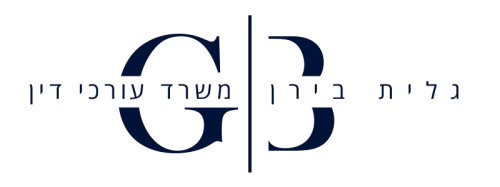Best Nonprofit & Charitable Organizations Lawyers in Ramat Gan
Share your needs with us, get contacted by law firms.
Free. Takes 2 min.
List of the best lawyers in Ramat Gan, Israel
About Nonprofit & Charitable Organizations Law in Ramat Gan, Israel
Nonprofit and charitable organizations play a vital role in the civic and social life of Ramat Gan, Israel. These organizations engage in various activities, such as education, culture, welfare, health, and advancement of social causes. Legally, most nonprofits in Ramat Gan operate as Amutot (registered associations), Public Benefit Companies, or trusts, each with their own regulations and oversight requirements. The laws governing nonprofits aim to ensure accountability, transparency, proper management, and the responsible use of public and donor funds. While many nonprofits function smoothly and fulfill their missions, it is essential to understand the legal framework to avoid pitfalls and ensure lawful operation.
Why You May Need a Lawyer
Legal advice is especially important in the nonprofit sector due to the unique regulatory requirements and oversight by governmental authorities. Here are some common situations where consulting a lawyer is highly recommended:
- Establishing a new nonprofit, association, or public benefit company and navigating registration procedures
- Drafting and amending bylaws, charters, or organizational documents
- Ensuring compliance with reporting, governance, and tax obligations
- Managing donations, grants, and funding in line with the law
- Preventing or addressing conflicts of interest among board members
- Responding to audits or inquiries by regulatory authorities such as the Registrar of Associations
- Employment law matters related to nonprofit staff and volunteers
- Structuring relationships with international donors or partners
- Dealing with mergers, closures, or the transfer of assets
- Handling disputes between members, employees, or with governmental agencies
Local Laws Overview
Ramat Gan, like all cities in Israel, is subject to national laws regulating nonprofit and charitable organizations, with oversight by the Ministry of Justice. The key laws and regulations include:
- The Law of Associations (Amutot Law), 1980 - Governs registration, reporting, and operation of associations (Amutot), which are the most common nonprofit structure in Israel.
- Companies Law - Applies to Public Benefit Companies, which are nonprofits set up as companies with no profit distribution.
- Income Tax Ordinance - Concerns tax exemptions for nonprofits, including the important sections 9(2) and section 46 for donor tax-deductibility.
- Registrar of Associations - The governmental body responsible for overseeing Amutot, ensuring their compliance with legal requirements.
- Reporting Obligations - Nonprofits must submit annual financial statements, activity reports, and affidavits signed by committee members.
- Permits and Approvals - Nonprofits seeking government funding or eligibility for donations must secure various approvals, such as the Nihul Takin (Proper Management Certificate).
- Local Municipality Regulations - Municipalities, including Ramat Gan, may have specific procedures, especially for permits, property tax exemptions, and local support grants.
Complying with these laws is crucial to ensure your nonprofit’s legality, sustainability, and reputation.
Frequently Asked Questions
What is the process for registering a nonprofit (Amutah) in Ramat Gan?
To register an Amutah, you must submit required documents, including a founding meeting protocol, signed bylaws, and forms with details of founding members, to the Registrar of Associations. Once reviewed and approved, the Amutah receives a registration number and can begin operations.
What annual reports must nonprofits file in Ramat Gan?
Nonprofits must file an annual financial report, a report of activities, declarations from the audit committee, and proof of payment of annual registration fees to the Registrar of Associations.
Can nonprofits in Ramat Gan receive tax-deductible donations?
Yes, if they obtain section 46 approval from the Tax Authority, donations to the nonprofit will be tax-deductible for donors, subject to certain conditions.
Are there restrictions on how nonprofits can use their funds?
Nonprofits are legally required to use their funds solely for their stated public purposes, as defined in their bylaws. Personal benefit or improper use of the organization’s assets is strictly forbidden.
What is a Nihul Takin certificate, and why is it important?
A Nihul Takin (Proper Management) certificate is issued by the Registrar of Associations to nonprofits that comply with good governance and reporting standards. It is often required for eligibility for government funding and tenders.
How many founders are needed to start an Amutah?
Israeli law requires a minimum of seven founding members to establish an Amutah, all of whom must be adults eligible to take legal actions.
Can a nonprofit operate nationwide if registered in Ramat Gan?
Yes, registration in Ramat Gan does not limit the nonprofit’s geographic area of activity within Israel.
What are the roles of the governing bodies within a nonprofit?
An Amutah must have a general assembly, a board (managing committee), and an audit committee. Each group has specific responsibilities regarding oversight, management, and compliance.
Can a nonprofit employ staff and pay salaries?
Yes, nonprofits can employ staff and pay salaries, as long as the compensation is reasonable and reflects the services rendered to advance nonprofit goals.
How can disputes among nonprofit members be resolved?
Most disputes are first addressed internally under the organization’s bylaws, but unresolved issues may require mediation, arbitration, or legal proceedings in court.
Additional Resources
If you are seeking additional information or assistance, the following resources can be valuable:
- Registrar of Associations (Rasham Ha’amutot) - Government office for registration and oversight of Amutot
- Israel Tax Authority - For questions regarding section 46 and nonprofit tax exemptions
- Ministry of Justice - Legal guidelines and resources for non-profit governance
- Ramat Gan Municipality - Information on local regulations, support, and resources for nonprofits
- Civic organizations such as The Israeli Center for Nonprofits - Guidance, training, and legal support for the third sector
Next Steps
If you are considering starting a nonprofit in Ramat Gan, are part of an existing organization, or face legal issues within your charitable body, it is wise to consult with a lawyer who specializes in nonprofit and charity law. Gather your organizational documents, financial records, correspondence with authorities, and any relevant questions before your consultation. Proactive legal guidance can help you navigate regulations confidently, avoid penalties, and focus on furthering your mission in the community.
To proceed:
- Make a list of your organization’s needs, challenges, or pending legal questions
- Contact a qualified lawyer with experience in nonprofit and charitable organizations in Israel
- Prepare documentation, including registration papers, bylaws, and recent reports
- Schedule a consultation to discuss your situation and receive tailored legal advice
Taking these steps will help ensure your organization’s legal health and promote its ongoing success in Ramat Gan and beyond.
Lawzana helps you find the best lawyers and law firms in Ramat Gan through a curated and pre-screened list of qualified legal professionals. Our platform offers rankings and detailed profiles of attorneys and law firms, allowing you to compare based on practice areas, including Nonprofit & Charitable Organizations, experience, and client feedback.
Each profile includes a description of the firm's areas of practice, client reviews, team members and partners, year of establishment, spoken languages, office locations, contact information, social media presence, and any published articles or resources. Most firms on our platform speak English and are experienced in both local and international legal matters.
Get a quote from top-rated law firms in Ramat Gan, Israel — quickly, securely, and without unnecessary hassle.
Disclaimer:
The information provided on this page is for general informational purposes only and does not constitute legal advice. While we strive to ensure the accuracy and relevance of the content, legal information may change over time, and interpretations of the law can vary. You should always consult with a qualified legal professional for advice specific to your situation.
We disclaim all liability for actions taken or not taken based on the content of this page. If you believe any information is incorrect or outdated, please contact us, and we will review and update it where appropriate.














